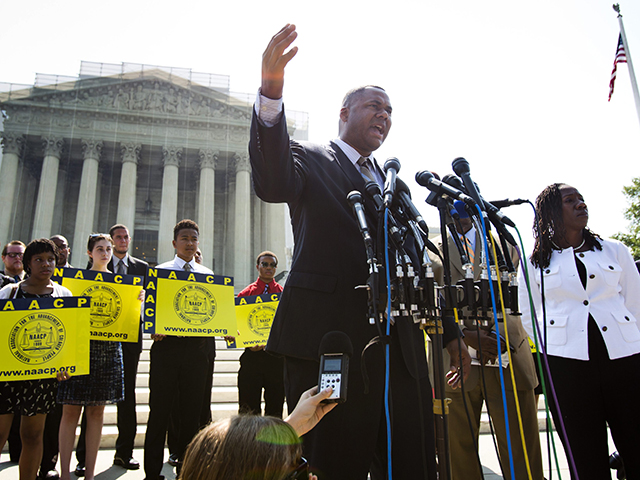The NAACP’s Hypocrisy on Voter ID
Hans von Spakovsky /

Ryan Haygood, the Director of the NAACP Legal Defense and Educational Fund, gathers with civil rights activists outside the Supreme Court to protest the high court’s decision to strike down part of the Voting Rights Act of 1965 in Washington, DC in June 2013. / EPA/JIM LO SCALZO
Katie McHugh of the Daily Caller has a great story that really shows the hypocrisy of voter ID opponents: the North Carolina chapter of the NAACP is organizing a protest march against the state’s new voter ID law, but the flyer being handed out to participants tells them that they must “bring photo identification (driver’s license, passport or other valid photo id) with you.” This is the same NAACP chapter that filed a lawsuit against North Carolina’s voter ID law in August 2013, claiming it violates Section 2 of the Voting Rights Act and the Fourteenth and Fifteenth Amendments.
>>> Check Out: IRS-Targeted Scandal Victims Will Not Be Silenced (VIDEO)
This is also the same NAACP chapter whose president, Rev. William Barber II, insulted Sen. Tim Scott (R-SC), the first African American Republican to serve as a senator since the end of reconstruction, by calling him a “ventriloquist’s dummy” because he is a conservative. While Barber obviously feels free to voice his opinions to the press, his organization apparently doesn’t want the voter ID protesters to do so. Another instruction contained in the NAACP flyer is that protestors should “direct media inquiries to spokespersons.”
That is probably a necessary restriction from the NACCP’s standpoint given that the vast majority of North Carolina residents disagree with the NAACP’s position – a 2011 poll by Elon University found that 75 percent of North Carolinians support the voter ID law. They certainly wouldn’t want protestors to go “off message” or to admit to reporters covering the event that they actually already have a photo ID and won’t have any problems voting.
In addition to the NAACP lawsuit and another suit filed by the League of Women Voters of North Carolina, Eric Holder’s Justice Department filed suit in September of 2013. Holder claims the voter ID law was enacted with a “discriminatory purpose” and will have a “disparate impact” on African-American voters. All three of these lawsuits were consolidated in December for discovery and scheduling purposes. The judge in those cases, Thomas D. Schroeder, issued two seemingly conflicting orders recently. On Jan. 27 he allowed five additional plaintiffs who are against the voter ID law to intervene in the League of Women Voters lawsuit. Yet only a week later on Feb. 6, he denied intervention in the DOJ lawsuit to Judicial Watch and Christina Kelley Gallegos-Merrill, a North Carolina candidate who lost an election by only 13 votes after initially being declared the winner due to votes by college students that she believes may have been ineligible and would have been prevented by a voter ID requirement.
So parties who are against voter ID were allowed in, but parties in support of voter ID were not allowed into the lawsuits because the judge said that allowing them in “would consume additional and unnecessary judicial resources, further complicate the discovery process, potentially unduly delay the adjudication of the case on the merits, and generate little, if any, corresponding benefit to the existing parties.” But the judge did not believe that allowing five additional plaintiffs who are against voter ID into the lawsuit would pose the same problems.
This contradictory attitude raises serious questions about whether North Carolina, the defendant in these cases, is going to get a fair hearing on the merits of the voter ID law.
